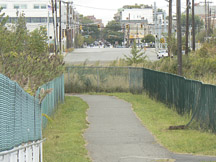Jersey Avenue is known primarily as a road running through the heart of Downtown Jersey City. It stops by a creek behind the Jersey City Medical Center, then leads into a footbridge that extends over Mill Creek and into Liberty State Park.
But there have been proposals for years to extend Jersey Avenue, to allow traffic to enter into the park directly rather than take a roundabout route across several city blocks. Also, the extension would allow for emergency vehicles to enter into the park directly and transport those who fall ill in the park to local hospitals faster, such as the Jersey City Medical Center on Grand Street, located in the vicinity of the extension.
The Jersey Avenue Extension would take 18 months to complete.
________
If the grant is approved by the USDOT, then the $72 million will cover the three components of the project to be completed: construction of Jersey Avenue between Grand Street and Johnston Avenue/Audrey Zapp Drive, construction of the Mill Creek Bridge, and extension of a combined city sewer outlet into Mill Creek to just east of the proposed extension of Jersey Avenue.
If and when the project is completed, Jersey Avenue going into Phillips Avenue in Liberty State Park would become a 36-foot wide boulevard with two travel lanes and one parking lane. A 10-foot-wide bike path would be adjacent to the travel lane on one side of the roadway and separated by a landscaped island. Sidewalks will be constructed on both sides of the roadway. Also, there will be a bridge over Mill Creek spanning 125 feet in length.
The city, in their application document, estimates the project will take 18 months to complete. The project would have to start by August, 2010 since TIGER Grants will be authorized for projects that can be completed by Feb. 17, 2012.
Support of all kinds
The fact that the city has gotten this far toward extending Jersey Avenue can be seen as progress, as there has been opposition from Downtown neighborhood groups and the advocacy group Friends of Liberty State Park over the increased traffic coming through residential areas as well as disturbing nature.
City Councilman Steven Fulop said the project, if it takes place, will be a “good thing” for both Downtown residents who use the footbridge to go into the park, and for Bergen-Lafayette residents who have to deal with cars coming from the park and going through their neighborhoods to get to Downtown.
“Creating the access there and providing extra usage, and the promise of safety on the current footbridge will be good,” Fulop said.
Sam Pesin, president of Friends of Liberty State Park, said when the project was first considered in the 1990s, there had been opposition because there was talk of creating a four-lane road. However, in conversations with city officials involved in the project, they promised Pesin there will only be a two lane road connecting different parts of the city.
“Having a world-class local road, which hopefully will discourage regional commuters and which is a positive connection between neighborhoods, and between the neighborhoods and Liberty State Park and also is an attractive entrance to Liberty State Park, will make the Extension sensible and helpful in enhancing people’s quality of life in Jersey City,” Pesin said.
Other officials have offered their approval of the project coming to fruition, with letters encouraging the U.S. Department of Transportation to consider the grant including Mayor Jerramiah Healy, State Sen. Sandra Cunningham (NJ-31), and U.S. Senator Frank Lautenberg.
The letters all have in common their citing of the extension allowing for more visitors to come to Liberty State Park, which already receives three million people, and the necessity of a direct route between the park and the Medical Center.
Ricardo Kaulessar can be reached at rkaulessar@hudsonreporter.com.
